
News of the story
"After the Fact: Lukashenko’s Decisions"
Summer is the hottest time for graduates. Both for those who left school and are taking their first steps into adulthood, and for those who graduated from universities and are starting a new chapter in the professional life. In some ways, this period is exciting for the state too. The Belarusian president called education a fundamental pillar of the state for a reason. If there are no educated, trained youth in the country today, there will be no country tomorrow, Aleksandr Lukashenko is convinced. In this episode we will tell you why Belarusian universities are increasingly keen to enroll employer-sponsored students and how they differ from tuition-free students and fee-paying students. What are the advantages of employer-sponsored training? What does the head of state require from universities and enterprises who sponsor the training?
What are employer-sponsored programs?
The Belarusian education system has long been keen on employer-sponsored programs. Earlier the work lacked consistency. Now the state has a strategy and tactics. The automated system “Employer-Sponsorship and Admissions" has been operating in Belarus for a few years. It helps project specialist needs for years to come. On the basis of this information, educational institutions draw up their admission plans.
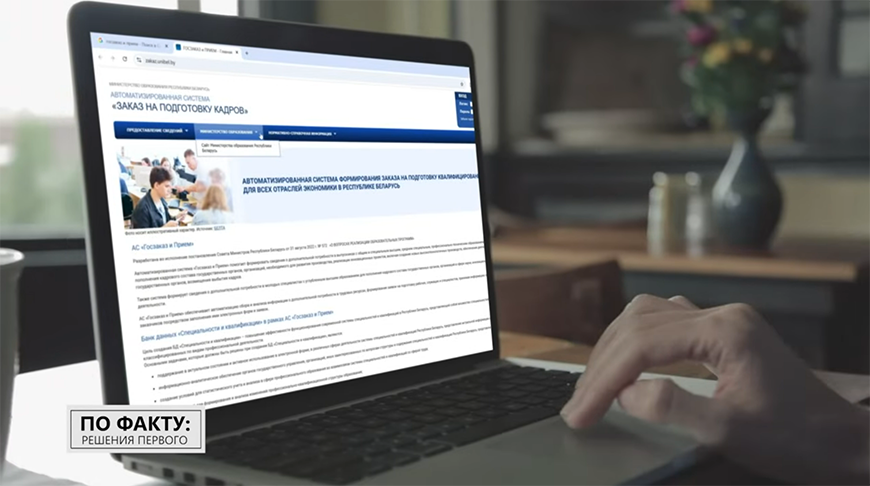
Every state-funded student place is actually sponsored by an employer as graduates have their first job assignments in organizations and enterprises. This does not only address personnel shortages but also provides young professionals with a guaranteed job.
Employer-sponsored education in its classical sense has been gaining momentum in the country. This is a unique opportunity for young people to get an education at the expense of a future employer. An applicant concludes a tripartite contract where the signatories are the university, the enterprise and himself/herself. Everything is simple: the company undertakes to pay for studies, and the graduate - to work for the employer for at least five years.

The benefits are obvious: students study for free and have a guaranteed job, while business gets trained specialists that are well-versed in a company's line of business. Any organization or enterprise can send students to universities. From any industry, any form of ownership. And this is not a tribute to fashion, but a necessity.
“This year we have about 6,500 employer-sponsored students at universities and 6,900 employer-sponsored students at vocational schools. Their number is growing every year. Each enterprise should ensure a competitive application process. The number of applicants should be 1.5-2 times bigger than the number of seats. Our healthcare institutions have made considerable progress here: in recent years, the number of employer-sponsored students has approached 80% of all sponsored learners. Pedagogical universities and agricultural organizations follow suit. The industrial sector is not lagging behind either; thus, more and more students sign training contracts with our industrial enterprises,” said Sergei Pishchov, the head of the Professional Education Directorate at the Education Ministry of Belarus.
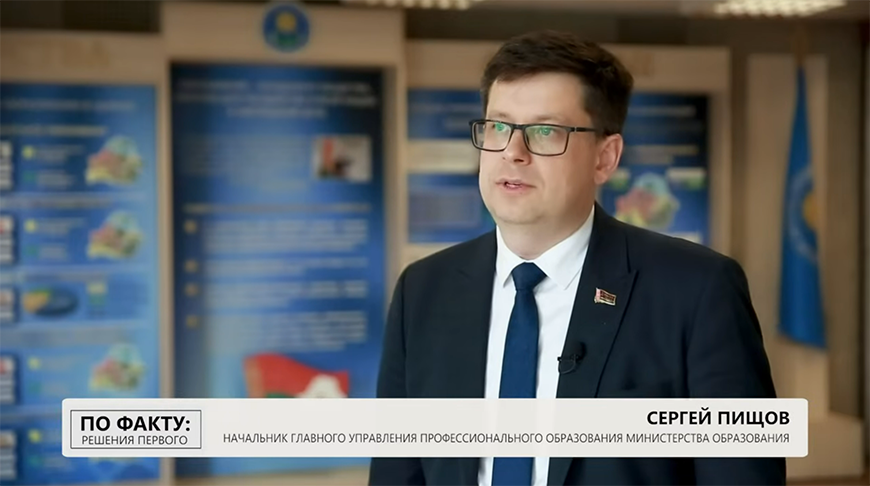
How to get a contract?
How does this system work in practice? By 1 May, the Education Ministry approves the list of employers and the number of employer-sponsored places at universities. After that, an applicant can contact potential employers, study how they work and sign a training contract with them. Simultaneously, applicants can prepare for admission: the questions that will be asked during oral entrance examinations in various subjects are posted on the website of the Education Ministry right away.
A minimum average grade of seven in the school certificate is a mandatory requirement for most educational programs. Government institutions, organizations and enterprises can sign contracts with several applicants for one designated place. The competition (and employers are often required to ensure competitive admission) helps select the most motivated and prepared students.
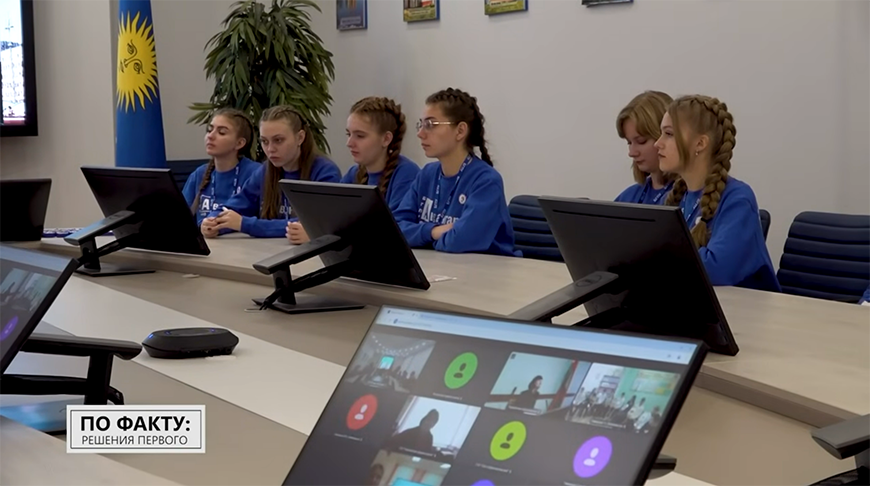
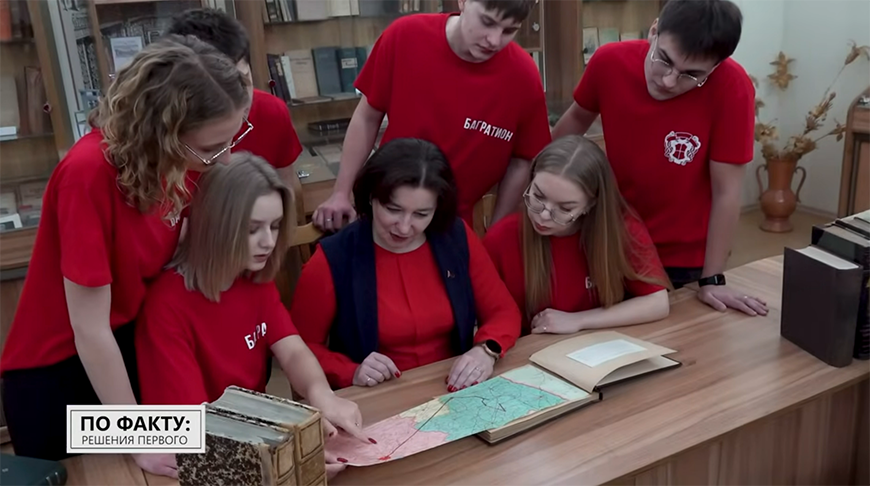
What are employer-sponsored programs?
The Belarusian education system has long been keen on employer-sponsored programs. Earlier the work lacked consistency. Now the state has a strategy and tactics. The automated system “Employer-Sponsorship and Admissions" has been operating in Belarus for a few years. It helps project specialist needs for years to come. On the basis of this information, educational institutions draw up their admission plans.

Every state-funded student place is actually sponsored by an employer as graduates have their first job assignments in organizations and enterprises. This does not only address personnel shortages but also provides young professionals with a guaranteed job.
Employer-sponsored education in its classical sense has been gaining momentum in the country. This is a unique opportunity for young people to get an education at the expense of a future employer. An applicant concludes a tripartite contract where the signatories are the university, the enterprise and himself/herself. Everything is simple: the company undertakes to pay for studies, and the graduate - to work for the employer for at least five years.

The benefits are obvious: students study for free and have a guaranteed job, while business gets trained specialists that are well-versed in a company's line of business. Any organization or enterprise can send students to universities. From any industry, any form of ownership. And this is not a tribute to fashion, but a necessity.
“This year we have about 6,500 employer-sponsored students at universities and 6,900 employer-sponsored students at vocational schools. Their number is growing every year. Each enterprise should ensure a competitive application process. The number of applicants should be 1.5-2 times bigger than the number of seats. Our healthcare institutions have made considerable progress here: in recent years, the number of employer-sponsored students has approached 80% of all sponsored learners. Pedagogical universities and agricultural organizations follow suit. The industrial sector is not lagging behind either; thus, more and more students sign training contracts with our industrial enterprises,” said Sergei Pishchov, the head of the Professional Education Directorate at the Education Ministry of Belarus.

How to get a contract?
How does this system work in practice? By 1 May, the Education Ministry approves the list of employers and the number of employer-sponsored places at universities. After that, an applicant can contact potential employers, study how they work and sign a training contract with them. Simultaneously, applicants can prepare for admission: the questions that will be asked during oral entrance examinations in various subjects are posted on the website of the Education Ministry right away.
A minimum average grade of seven in the school certificate is a mandatory requirement for most educational programs. Government institutions, organizations and enterprises can sign contracts with several applicants for one designated place. The competition (and employers are often required to ensure competitive admission) helps select the most motivated and prepared students.
If applicants fail to enter a university on an employer-sponsored program, they can go through the general admissions process. But for this they need to pass all the required entrance exams.
“The Economy Ministry and the Ministry of Labor and Social Protection should proactively forecast future labor market needs and tailor educational programs accordingly. But what do we see in reality, especially when we launch new enterprises? A shortage of personnel. Everyone knows that there is no better way to ensure student enrollment for sponsored courses than employer-sponsored programs. This form of work has proven to be successful. Heads of industrial and agricultural enterprises and other companies were instructed to scale it. That said, employers should definitely have no problems choosing target universities,” Aleksandr Lukashenko said several years ago.

What advantages does employer-sponsored education have?
The advantages of employer-sponsored programs are obvious. In addition to the opportunity to get an education and a guaranteed job, students can gain valuable hands-on experience and build connections with future employers. Sometimes, after studying at a university for several years, young people have to learn everything from scratch at their first job. Therefore, employer-sponsored programs are meant to prevent such situations. In other words, young professionals are involved in work from day one.
“After the eighth grade, I made up my mind (it was my own decision) to enter a cadet school. I studied there for four years and realized that I wanted to work at government agencies. I have always had a strong sense of justice. And from the very beginning I was considering the Academy of the Ministry of Internal Affairs, since both my father and sister serve in the police, and my grandfather also served in the police. When I graduated from the cadet school, I learned that the Investigative Committee sponsored studies at law school. It was an opportunity not to be missed,” Zlata Goloveichuk, a law student at Belarusian State University, said.
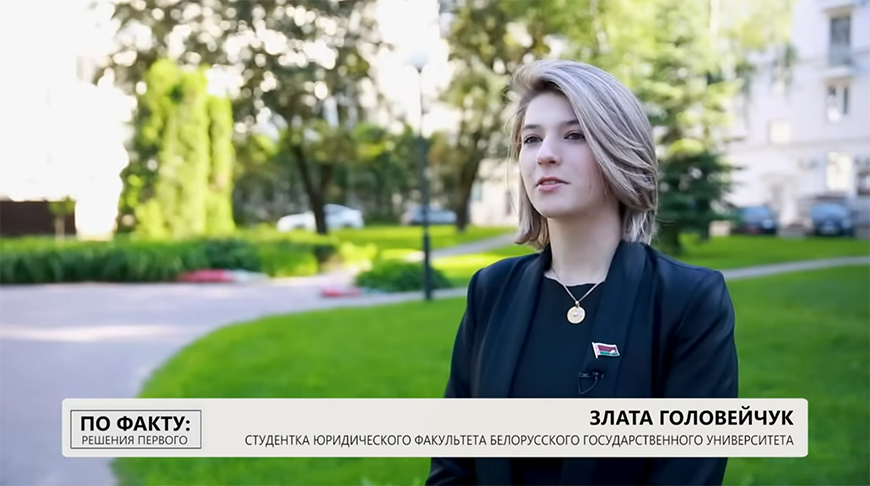
Zlata signed an agreement with the Minsk Oblast Department of the Investigative Committee region and after graduation she will have to work in one of the units for at least five years. But, apparently, Zlata has even more far-sighted plans.
“Many people see this in a negative way, ‘hostage of this contract’ like situation. I believe that employer-sponsored education is a great thing. This means job security. Now one year of training at law school costs about Br7,000. The Investigative Committee pays for us. We study free of charge and receive scholarships. The Investigative Committee also offers a plan of activities, which envisages continuous interaction between employer and students. It is great that government agencies are open for such a dialogue with students,” Zlata said.
Why do schools set up electives?
Many organizations and enterprises understand the need to have their future employees trained starting from school. That is why Belarusian schools introduce electives today.
For example, future engineers, in addition to in-depth study of physics, mathematics and chemistry, get familiar with the industrial potential of their region and the whole country, visit enterprises, communicate with leading specialists and students. This means valuable hands-on experience. In pedagogical classes, students study teaching methods and try on the role of a teacher.
“At the beginning of my ninth grade, when I had to choose my future profession, I was thinking about what I liked best. I chose to be a biology and chemistry teacher. Then I learned that the pedagogical class offered an opportunity of entering the pedagogical university without exams. There is a supervising teacher in pedagogical classes, who teaches us the basics of pedagogy and psychology that we need as future specialists,” said Sergei Semashko, a graduate of the Natural Science Faculty of Maksim Tank Belarusian State Pedagogical University.
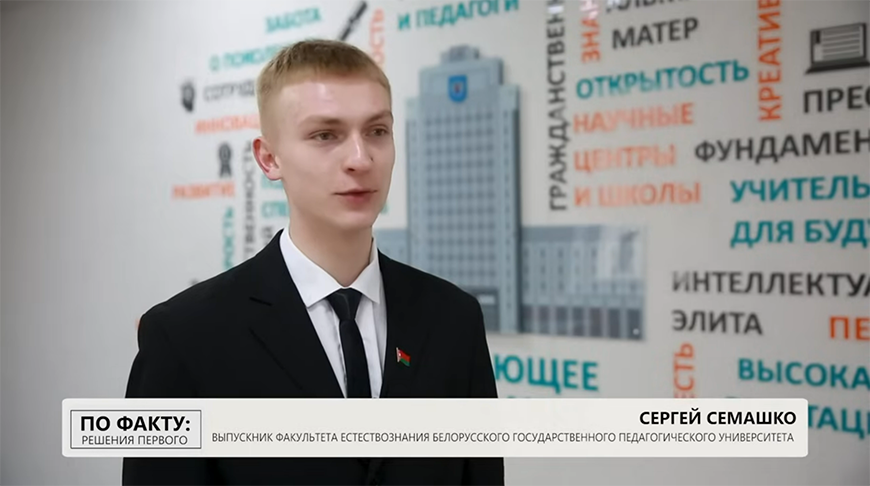
Teachers advised him to sign an employer-sponsored contract. This guarantees the young man that after graduation he will return to his native Osipovichi, and will not be sent to a random place in Belarus as part of the postgraduate job assignment.
“This gives you an opportunity to return to your hometown, to your home school and even work together with your former teachers. If I were to enter university as part of the general competition, I would be sent to work at the place where I would be needed as a young specialist. But I’d like to work in my hometown,” the young specialist said.

What advantages does employer-sponsored education have?
The advantages of employer-sponsored programs are obvious. In addition to the opportunity to get an education and a guaranteed job, students can gain valuable hands-on experience and build connections with future employers. Sometimes, after studying at a university for several years, young people have to learn everything from scratch at their first job. Therefore, employer-sponsored programs are meant to prevent such situations. In other words, young professionals are involved in work from day one.
“After the eighth grade, I made up my mind (it was my own decision) to enter a cadet school. I studied there for four years and realized that I wanted to work at government agencies. I have always had a strong sense of justice. And from the very beginning I was considering the Academy of the Ministry of Internal Affairs, since both my father and sister serve in the police, and my grandfather also served in the police. When I graduated from the cadet school, I learned that the Investigative Committee sponsored studies at law school. It was an opportunity not to be missed,” Zlata Goloveichuk, a law student at Belarusian State University, said.

Zlata signed an agreement with the Minsk Oblast Department of the Investigative Committee region and after graduation she will have to work in one of the units for at least five years. But, apparently, Zlata has even more far-sighted plans.
“Many people see this in a negative way, ‘hostage of this contract’ like situation. I believe that employer-sponsored education is a great thing. This means job security. Now one year of training at law school costs about Br7,000. The Investigative Committee pays for us. We study free of charge and receive scholarships. The Investigative Committee also offers a plan of activities, which envisages continuous interaction between employer and students. It is great that government agencies are open for such a dialogue with students,” Zlata said.
Why do schools set up electives?
Many organizations and enterprises understand the need to have their future employees trained starting from school. That is why Belarusian schools introduce electives today.
For example, future engineers, in addition to in-depth study of physics, mathematics and chemistry, get familiar with the industrial potential of their region and the whole country, visit enterprises, communicate with leading specialists and students. This means valuable hands-on experience. In pedagogical classes, students study teaching methods and try on the role of a teacher.
“At the beginning of my ninth grade, when I had to choose my future profession, I was thinking about what I liked best. I chose to be a biology and chemistry teacher. Then I learned that the pedagogical class offered an opportunity of entering the pedagogical university without exams. There is a supervising teacher in pedagogical classes, who teaches us the basics of pedagogy and psychology that we need as future specialists,” said Sergei Semashko, a graduate of the Natural Science Faculty of Maksim Tank Belarusian State Pedagogical University.

Teachers advised him to sign an employer-sponsored contract. This guarantees the young man that after graduation he will return to his native Osipovichi, and will not be sent to a random place in Belarus as part of the postgraduate job assignment.
“This gives you an opportunity to return to your hometown, to your home school and even work together with your former teachers. If I were to enter university as part of the general competition, I would be sent to work at the place where I would be needed as a young specialist. But I’d like to work in my hometown,” the young specialist said.


Why does Lukashenko support employer-sponsored training?
Someone thinks that employer-sponsored training is chosen by those who fail to get enrolled for tuition-free programs. That is not true. The most motivated and driven young people become employer-sponsored students. This step is always a well-thought and informed decision. Many of such students have contemplated this option for years. Employer-sponsored training is the choice of those who seriously think about their future.
“We need to pay serious attention to employer-sponsored education. This issue is important because we need teachers, doctors, agronomists, and zootechnics at a specific place in a particular region. There are people who want to enter universities on employer-sponsored programs. There are enough of them, and we need to support them,” the president said during one of the meetings.
“Employer-sponsored education is chosen by motivated applicants. The passing scores and competition speak for themselves. It is not a fallback option for those who could not get in elsewhere. This is why we do this enrollment separately, before the main admission round. We enroll the future elite of our enterprises. From the very first day, these applicants know where they will work. This is a generation who makes conscious choices. Other applicants should look at them as an example. Moreover, the growing number of employer-sponsored student programs and the consistent positive trend confirm that this approach is effective,” Sergei Pishchov stressed.
Someone thinks that employer-sponsored training is chosen by those who fail to get enrolled for tuition-free programs. That is not true. The most motivated and driven young people become employer-sponsored students. This step is always a well-thought and informed decision. Many of such students have contemplated this option for years. Employer-sponsored training is the choice of those who seriously think about their future.
“We need to pay serious attention to employer-sponsored education. This issue is important because we need teachers, doctors, agronomists, and zootechnics at a specific place in a particular region. There are people who want to enter universities on employer-sponsored programs. There are enough of them, and we need to support them,” the president said during one of the meetings.
The Education Ministry has compared the average academic performance of graduates from the state-funded and the employer-sponsored programs. The findings revealed that there were no significant differences between the two. However, graduates from tuition-paying programs did not perform as well as their peers. The ministry views this as further confirmation that the state is on the right track.
“Employer-sponsored education is chosen by motivated applicants. The passing scores and competition speak for themselves. It is not a fallback option for those who could not get in elsewhere. This is why we do this enrollment separately, before the main admission round. We enroll the future elite of our enterprises. From the very first day, these applicants know where they will work. This is a generation who makes conscious choices. Other applicants should look at them as an example. Moreover, the growing number of employer-sponsored student programs and the consistent positive trend confirm that this approach is effective,” Sergei Pishchov stressed.
Certainly, if there were no problems in education and labor market, these issues would have long disappeared from the president’s agenda. But they are regularly raised at the highest level: during meetings on the economy, science, agriculture, and regional policy. Aleksandr Lukashenko sees shortcomings both in educational institutions and the enterprises that sponsor student programs. The former are sometimes slow to update and tailor their educational programs, while the latter often fail to properly support and retain young specialists. The president speaks openly and publicly about these problems.
The head of state insists on revising the list of specialties to align it with the needs of the economy, updating educational programs, and strengthening the practical component of training. In his view, education must take into consideration both academic goals and the interests of the real sector of economy.
“Stop training specialists that the country does not need. We seem to have forgotten how in the 1990s we trained hosts of lawyers and economists, who, after getting a degree, went to work as taxi drivers and pizza deliverers. Even now many graduates work outside their field of study. Training specialists who later choose to work in a field unrelated to their university degree, low employee retention in the first workplace, decision on a career change. These things are something our state cannot afford. Do we have nowhere else to spend our money on? If we take into account how much the state pays for it, we will see that this is nothing but an economic crime,” Aleksandr Lukashenko stated during a meeting with members of the National Council of Rectors of Higher Education Institutions in February last year.
“Stop training specialists that the country does not need. We seem to have forgotten how in the 1990s we trained hosts of lawyers and economists, who, after getting a degree, went to work as taxi drivers and pizza deliverers. Even now many graduates work outside their field of study. Training specialists who later choose to work in a field unrelated to their university degree, low employee retention in the first workplace, decision on a career change. These things are something our state cannot afford. Do we have nowhere else to spend our money on? If we take into account how much the state pays for it, we will see that this is nothing but an economic crime,” Aleksandr Lukashenko stated during a meeting with members of the National Council of Rectors of Higher Education Institutions in February last year.
The president emphasizes that it is not a coincidence: Belarusian youth should gain knowledge and fulfill their potential right here, in their homeland. Belarus has preserved what is the most important: continuity and high standards of traditional education. Since Soviet times, the knowledge acquired at Belarusian universities has been considered extremely valuable. Yes, there were times when the country was on the verge of implementing questionable reforms and experiments proposed by foreign foundations. But Belarus chose to stay true to proven principles.
Years ago, the country not only identified a strategic priority for state development, but also put it into practice. And there must be no deviation from that course today.
Years ago, the country not only identified a strategic priority for state development, but also put it into practice. And there must be no deviation from that course today.













